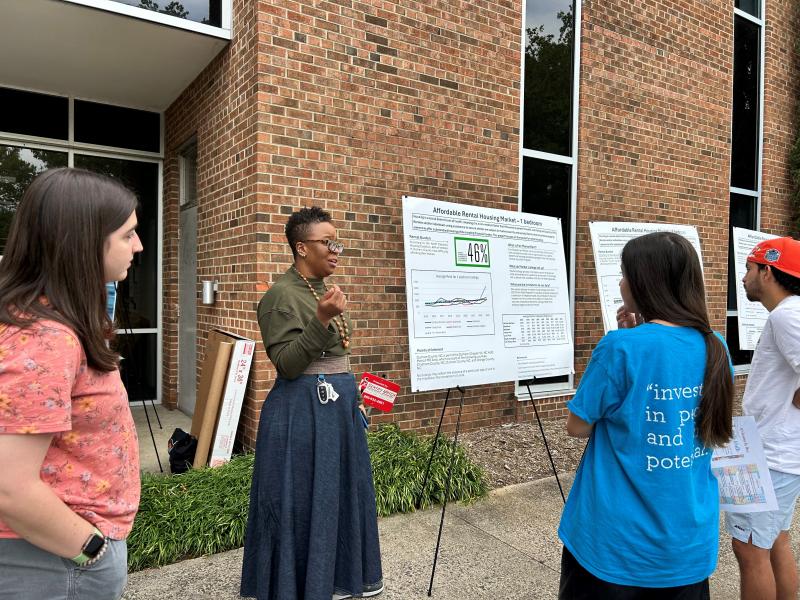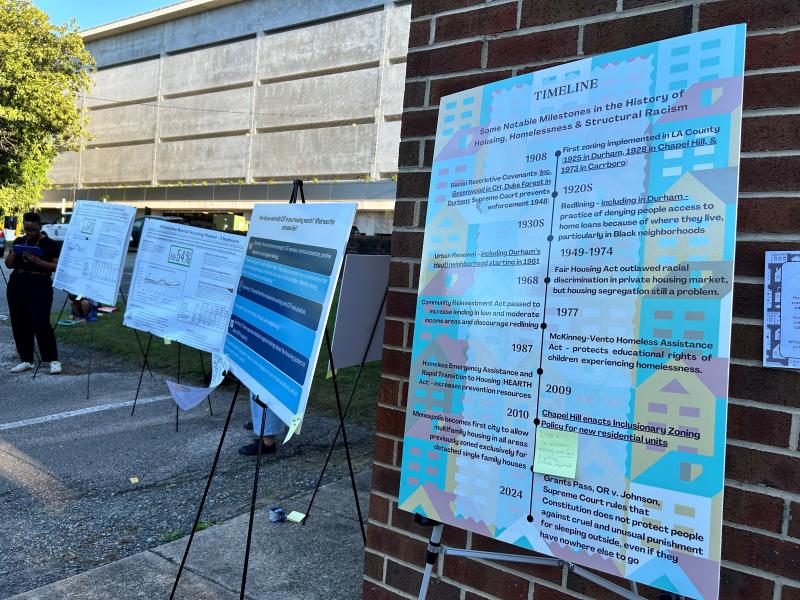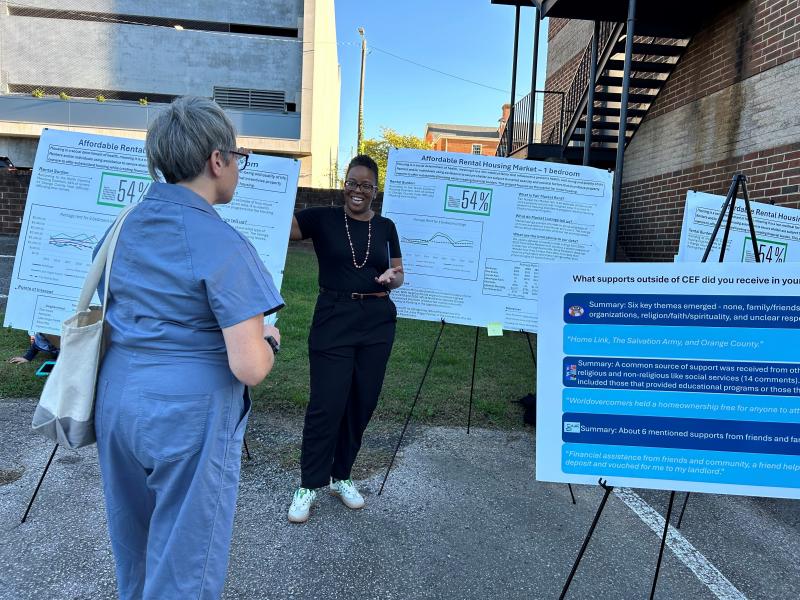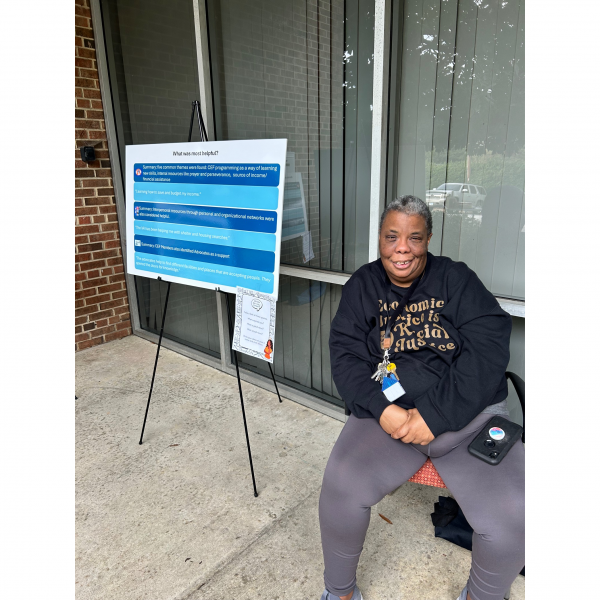
Conducting community-centered research
*Note: Story originally published December 14, 2022; updated in October 2024.
Community lives at the center of the life and research of Allison De Marco, PhD, MSW, advanced research scientist at the UNC Frank Porter Graham Child Development Institute (FPG). A deeply engaged member of the Chapel Hill and Carrboro community, De Marco has been involved for more than a decade in volunteer work addressing issues around homelessness in Orange County. This immersion has resulted in her work on community engaged research projects, including her current role as co-principal investigator (PI) for the study, “Overcoming Structural Racism in Housing Stability and Wealth-building: Laying the Foundation for Community Health and Wellbeing.”
The results of this investigation, which examines the relationships among housing stability, health and well-being, and climate change vulnerability, will be shared with residents who experience homelessness and housing instability as well as policymakers and staff at organizations working to serve those populations. Chapel Hill nonprofit Community Empowerment Fund (CEF)—which works with individuals at risk of and experiencing homelessness—brought this project to De Marco because of their longstanding collaboration. De Marco supervises MSW interns placed at CEF and co-teaches an economic justice course at the UNC School of Social Work for CEF’s undergraduate volunteers.
While CEF, De Marco, and Danielle Spurlock, PhD, an assistant professor in UNC-Chapel Hill’s Department of City and Regional Planning, are collaborating on this project, De Marco says that the community is directing it. This community-engaged research project is a result of her long-term relationships with people in the community and working directly with those community members to explore issues of concern to them. A hallmark of community-engaged research—in which stakeholders use their personal experience with the issue to guide the project—is returning benefit to the community. De Marco says that bringing resources to the Chapel Hill/Carrboro community was one of the reasons she, Spurlock, and CEF’s Donna Carrington were chosen for the research grant that is being run through CEF.
CEF Executive Director Donna Carrington, who serves as community PI for De Marco’s current project, exemplifies this community leadership. Carrington, who has lived experience of being unhoused, brings her expertise to help the team frame the questions to be explored, understand what the data means for people who are experiencing homelessness, and explore what the solutions could be. Other community partners contributing to the design and content of the study include organizations working on affordable housing and in the homeless service system as well as community residents of neighborhoods such as Chapel Hill’s Northside who have struggled for years with pressure from UNC students moving to the neighborhood and displacing long-term Black residents.
“One of the biggest shortcomings in the research endeavor is that we uncover systems and policies that are unjust, but we often don't move past that. I look forward to working with our community partners to frame our recommendations, share what actions we can take, and work with people who have decision making power in our communities to actually make change and work toward justice.”
To bridge the divide between academia and the community, De Marco recommends that scholars attend community events. She recently collaborated with CEF at a community event and together, they built a cardboard maze for kids to climb through, which was a big hit. She notes that attending events provides an opportunity for scholars to talk with and get to know community members and organizations’ staff and have the opportunity to build relationships and determine how they can be helpful. De Marco is also a regular presence at rallies, marches, and public hearings related to affordable housing.
She advises that scholars interested in pursuing community-engaged research talk with their university colleagues, noting that there are faculty and staff across the campus who have relationships with community partners. De Marco recognizes the challenges of this type of research, namely the lack of time, funding, and support. To address this, she suggests that faculty pursue two lines of research, with one focusing on secondary data or collaborating with a colleague who has existing data. She appreciates the value of a research center such as FPG—or partnering with a colleague at another university—encouraging scholars to work together on a research team. By having this avenue for publishing, researchers are able to allow a community-engaged project to proceed at a slower pace, since building trust is key and cannot be rushed.
She is currently working on publications with a colleague at the University of Michigan who has collected data. “I’m getting publications that way, which allows me to have a slower pace in my community work, follow their lead, and really to think about how this work can return benefit to the community,” says De Marco. “Having these alternative ways of making a go in the academic world are important if you want community-engaged research as part of your work.”
De Marco says that one of the exciting elements of this approach is working with the community to discern ways to address injustices revealed by the research. “One of the biggest shortcomings in the research endeavor is that we uncover systems and policies that are unjust, but we often don't move past that,” she says. “I look forward to working with our community partners to frame our recommendations, share what actions we can take, and work with people who have decision making power in our communities to actually make change and work toward justice.”
2024 STORY UPDATE | Team holds series of data walks in
"We had a great time hosting a series of data walks in Chapel Hill/Carrboro and Durham to share findings from our study on housing, homelessness, and structural racism with our community," said DeMarco. "This is the culmination of our two-year research project funded by the Robert Wood Johnson Foundation's Interdisciplinary Research Leadership program. We invited participants to share ideas for policy change, program change, or actions to advance equity."



